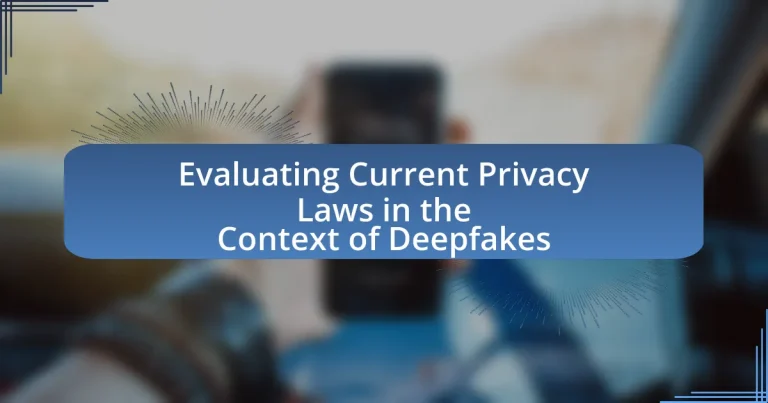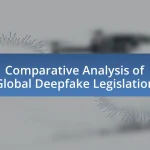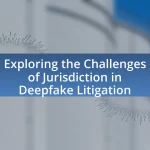The article evaluates current privacy laws in the context of deepfakes, focusing on regulations such as the California Consumer Privacy Act (CCPA) and the General Data Protection Regulation (GDPR). It examines how these laws address challenges posed by deepfake technology, including unauthorized use of personal likenesses and digital impersonation. The article also highlights the limitations of existing laws in combating deepfakes, the potential harms to individuals, and emerging legislative trends aimed at enhancing privacy protections. Additionally, it discusses best practices for individuals and organizations to safeguard privacy rights against deepfake misuse.
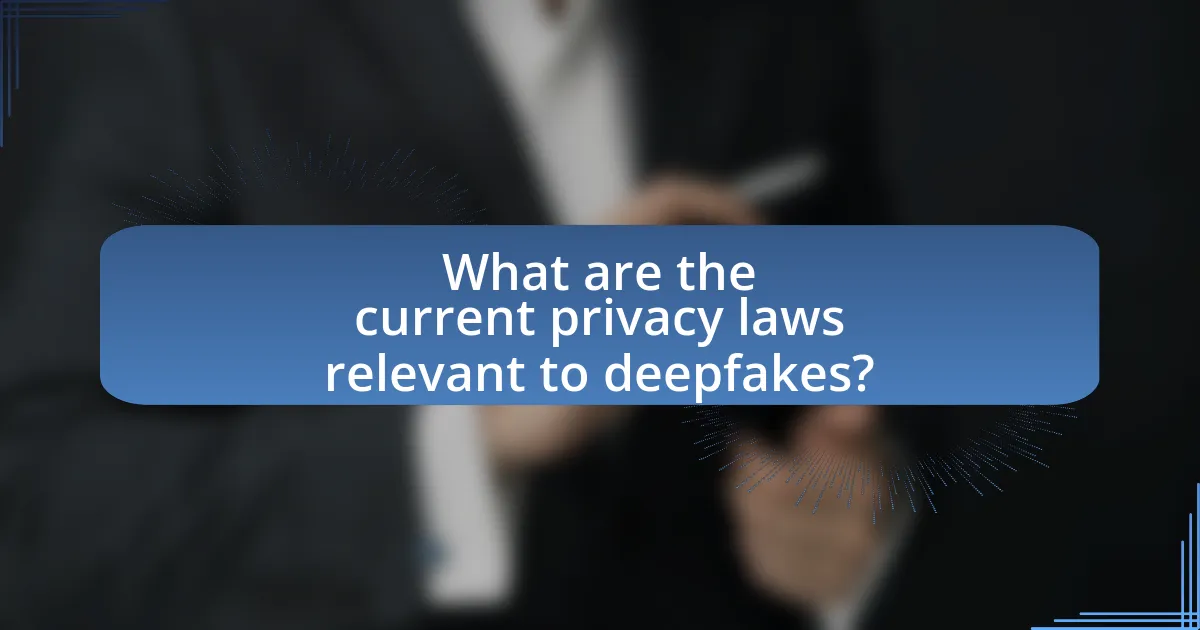
What are the current privacy laws relevant to deepfakes?
Current privacy laws relevant to deepfakes include the California Consumer Privacy Act (CCPA), which grants individuals rights over their personal data, and the General Data Protection Regulation (GDPR) in the European Union, which provides strict guidelines on data processing and consent. These laws address the unauthorized use of personal likenesses and the potential harm caused by deepfake technology. For instance, under the CCPA, individuals can request the deletion of their data, which can include images or videos manipulated into deepfakes. Similarly, the GDPR mandates that individuals must give explicit consent for their likeness to be used, which is particularly pertinent in the context of deepfakes that may misrepresent individuals.
How do these laws address the challenges posed by deepfakes?
Current privacy laws address the challenges posed by deepfakes by implementing regulations that enhance accountability and protect individuals from misuse of their likenesses. For instance, laws such as the California Consumer Privacy Act (CCPA) and various state-level anti-deepfake legislation specifically target the unauthorized use of deepfake technology to create misleading or harmful content. These laws empower individuals to seek legal recourse against those who create or distribute deepfakes without consent, thereby deterring malicious use. Additionally, they often include provisions for penalties and fines, reinforcing the legal consequences of violating privacy rights related to deepfakes.
What specific provisions exist in privacy laws regarding digital impersonation?
Privacy laws contain specific provisions addressing digital impersonation, primarily through statutes that protect individuals from identity theft and unauthorized use of personal information. For instance, the California Consumer Privacy Act (CCPA) includes provisions that allow individuals to request the deletion of personal data that has been misused, which can encompass cases of digital impersonation. Additionally, the Federal Trade Commission (FTC) enforces laws against deceptive practices, which can include impersonation online. These laws aim to safeguard individuals from harm caused by the unauthorized use of their identity in digital contexts, reinforcing the legal framework against such violations.
How do these laws protect individuals from unauthorized use of their likeness?
Laws protecting individuals from unauthorized use of their likeness, such as right of publicity statutes and privacy laws, grant individuals control over how their image and likeness are used commercially. These laws prevent unauthorized commercial exploitation by allowing individuals to sue for damages if their likeness is used without consent, thereby safeguarding personal identity and reputation. For instance, in the United States, many states have enacted right of publicity laws that specifically address the unauthorized use of an individual’s likeness for commercial purposes, providing a legal framework for individuals to seek redress and compensation.
What are the limitations of current privacy laws in combating deepfakes?
Current privacy laws face significant limitations in combating deepfakes due to their inability to address the rapid technological advancements and the specific nature of deepfake content. Existing laws often focus on traditional privacy violations, such as unauthorized use of personal data, but do not adequately cover the unique challenges posed by synthetic media, which can manipulate images and videos without consent. For instance, the lack of clear definitions regarding what constitutes a deepfake and the jurisdictional challenges in enforcing laws across different regions further complicate legal responses. Additionally, many privacy laws do not provide sufficient remedies for individuals harmed by deepfakes, leaving victims with limited recourse.
Why are existing laws often inadequate in addressing deepfake technology?
Existing laws are often inadequate in addressing deepfake technology due to their inability to keep pace with rapid technological advancements. Traditional legal frameworks typically focus on established forms of media and do not account for the unique characteristics of deepfakes, such as their potential for misuse in misinformation, identity theft, and defamation. For instance, laws regarding copyright and privacy were created before the advent of digital manipulation technologies, making them ill-suited to address the complexities of deepfakes. Additionally, the lack of specific legislation targeting deepfakes means that existing laws are often applied inappropriately or ineffectively, leading to gaps in legal protection for individuals affected by this technology.
How do jurisdictional differences affect the enforcement of privacy laws?
Jurisdictional differences significantly affect the enforcement of privacy laws by creating varying legal standards and regulatory frameworks across regions. For instance, the European Union’s General Data Protection Regulation (GDPR) imposes strict data protection requirements, while the United States lacks a comprehensive federal privacy law, leading to a patchwork of state laws. This disparity results in challenges for businesses operating internationally, as they must navigate differing compliance obligations, which can lead to inconsistent enforcement and potential legal conflicts. Furthermore, enforcement mechanisms vary; in the EU, regulatory authorities have the power to impose substantial fines for non-compliance, whereas in the U.S., enforcement may rely more on private litigation, which can be less uniform.
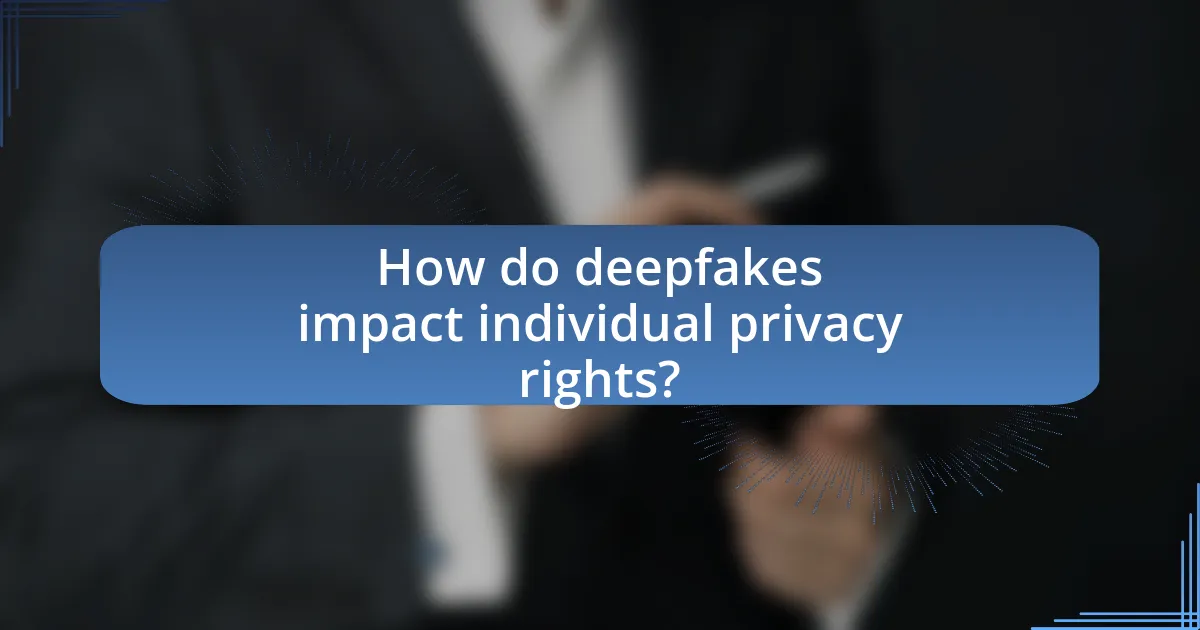
How do deepfakes impact individual privacy rights?
Deepfakes significantly undermine individual privacy rights by enabling the unauthorized creation and distribution of manipulated media that can misrepresent a person’s likeness or voice. This technology allows malicious actors to fabricate realistic videos or audio recordings, often without consent, leading to potential reputational harm, emotional distress, and identity theft. For instance, a study by the University of California, Berkeley, found that 96% of deepfake videos are pornographic in nature, often targeting women, which raises serious concerns about consent and exploitation. Furthermore, existing privacy laws struggle to address the unique challenges posed by deepfakes, as they often do not encompass the nuances of digital impersonation and the rapid dissemination of false information.
What are the potential harms caused by deepfakes to individuals?
Deepfakes can cause significant harm to individuals by enabling the creation of misleading and damaging content that can affect personal reputation, privacy, and safety. For instance, deepfakes can be used to fabricate non-consensual explicit material, leading to emotional distress and reputational damage for the victims. Research indicates that 96% of deepfake content is pornographic, often targeting women, which highlights the gendered nature of this harm. Additionally, deepfakes can facilitate misinformation campaigns, resulting in public embarrassment or loss of employment for individuals depicted in manipulated videos. The potential for identity theft and fraud also increases, as deepfakes can be used to impersonate individuals in various contexts, undermining trust in digital communications.
How can deepfakes lead to reputational damage?
Deepfakes can lead to reputational damage by creating misleading and harmful representations of individuals, which can be disseminated widely and rapidly through digital platforms. These manipulated videos or audio recordings can falsely depict someone engaging in inappropriate behavior or making controversial statements, leading to public backlash, loss of trust, and potential career repercussions. For instance, a study by the University of California, Berkeley, found that deepfake technology can significantly alter public perception, with 96% of participants unable to distinguish between real and fake videos, highlighting the potential for widespread misinformation and its damaging effects on reputations.
What psychological effects can deepfakes have on victims?
Deepfakes can lead to significant psychological effects on victims, including anxiety, depression, and a loss of trust in personal relationships. Victims often experience emotional distress due to the manipulation of their likeness, which can result in feelings of violation and helplessness. Research indicates that individuals targeted by deepfakes may suffer from long-term mental health issues, as the fabricated content can damage their reputation and social standing. A study published in the journal “Cyberpsychology, Behavior, and Social Networking” highlights that victims reported increased levels of paranoia and social withdrawal after being subjected to deepfake attacks, underscoring the profound impact these technologies can have on mental well-being.
How do deepfakes challenge the concept of consent in privacy laws?
Deepfakes challenge the concept of consent in privacy laws by enabling the creation of realistic but fabricated content that can misrepresent individuals without their approval. This technology allows for the manipulation of images and videos, often placing individuals in compromising or misleading situations, which raises significant concerns regarding the unauthorized use of one’s likeness. For instance, a study by the University of California, Berkeley, highlights that deepfakes can be used to create non-consensual pornography, violating personal autonomy and privacy rights. As existing privacy laws often rely on the notion of explicit consent for the use of personal images, deepfakes complicate legal frameworks by blurring the lines of consent and ownership over one’s digital representation.
What role does consent play in the creation and distribution of deepfakes?
Consent is crucial in the creation and distribution of deepfakes, as it determines the legality and ethical implications of using an individual’s likeness. Without consent, the creation of deepfakes can violate privacy rights and intellectual property laws, leading to potential legal repercussions. For instance, many jurisdictions have laws that protect individuals from unauthorized use of their image or likeness, which is particularly relevant in the context of deepfakes. The absence of consent can result in defamation, emotional distress, and reputational harm, reinforcing the necessity for explicit permission before utilizing someone’s identity in deepfake technology.
How can individuals assert their rights over their digital likeness?
Individuals can assert their rights over their digital likeness by utilizing existing privacy laws and intellectual property protections. In many jurisdictions, individuals have the right to control the use of their image and likeness under laws related to publicity rights, which protect against unauthorized commercial use. For instance, in the United States, the right of publicity varies by state but generally allows individuals to sue for damages if their likeness is used without consent for commercial purposes. Additionally, individuals can leverage data protection regulations, such as the General Data Protection Regulation (GDPR) in the European Union, which grants individuals rights over their personal data, including images. These legal frameworks provide avenues for individuals to challenge unauthorized uses of their digital likeness, particularly in the context of deepfakes, where misuse can lead to reputational harm or financial loss.
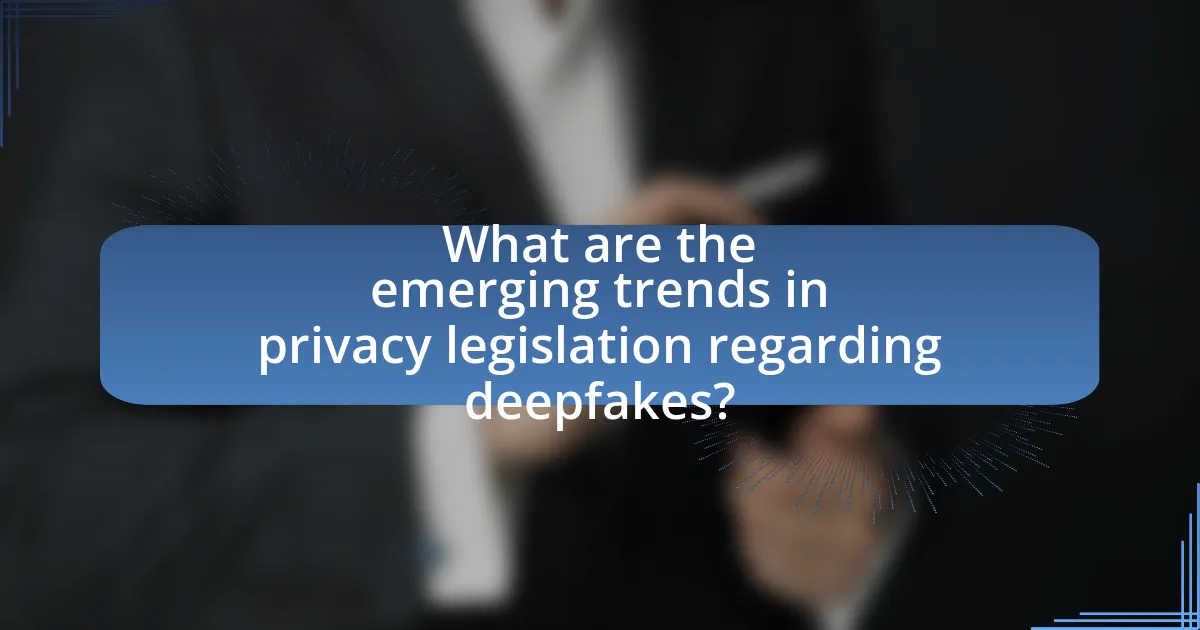
What are the emerging trends in privacy legislation regarding deepfakes?
Emerging trends in privacy legislation regarding deepfakes include the introduction of specific laws aimed at regulating the creation and distribution of deepfake content. For instance, several U.S. states, such as California and Texas, have enacted laws that criminalize the malicious use of deepfakes, particularly in contexts like election interference and non-consensual pornography. These laws reflect a growing recognition of the potential harm caused by deepfakes, leading to increased legislative efforts to protect individuals’ privacy rights. Additionally, there is a trend towards federal-level discussions in the U.S. about comprehensive regulations that could standardize protections against deepfakes across states, indicating a shift towards more unified and robust privacy protections in the digital landscape.
How are lawmakers adapting to the rise of deepfake technology?
Lawmakers are adapting to the rise of deepfake technology by introducing new legislation aimed at regulating its use and mitigating potential harms. For instance, several states in the U.S. have enacted laws that specifically criminalize the malicious use of deepfakes, particularly in contexts such as election interference and non-consensual pornography. In 2018, California passed a law making it illegal to use deepfake technology to harm or defraud others, and similar measures have been proposed in other states. Additionally, lawmakers are collaborating with technology experts to understand the implications of deepfakes and to develop guidelines that protect individuals’ privacy while balancing free speech rights. These legislative efforts reflect a growing recognition of the need to address the challenges posed by deepfake technology in the context of existing privacy laws.
What new legislative measures are being proposed to address deepfakes?
New legislative measures proposed to address deepfakes include the introduction of laws that criminalize the malicious use of deepfake technology, particularly in contexts such as election interference and non-consensual pornography. For instance, California’s AB 730, enacted in 2019, specifically targets the use of deepfakes to harm individuals or manipulate public opinion. Additionally, the proposed federal legislation, the Malicious Deep Fake Prohibition Act, aims to impose penalties for the creation and distribution of deepfakes intended to deceive or defraud. These measures reflect a growing recognition of the potential harms posed by deepfakes and the need for legal frameworks to mitigate their impact on privacy and public trust.
How are international bodies responding to the challenges posed by deepfakes?
International bodies are implementing regulatory frameworks and guidelines to address the challenges posed by deepfakes. For instance, the European Union has proposed the Digital Services Act, which aims to hold platforms accountable for harmful content, including deepfakes, by requiring them to take proactive measures against misinformation. Additionally, the Council of Europe has initiated discussions on the ethical implications of deepfakes, emphasizing the need for member states to develop legal responses that protect individuals from potential harm. These actions reflect a growing recognition of the risks associated with deepfakes, including misinformation and privacy violations, prompting international cooperation to establish effective legal standards and enforcement mechanisms.
What best practices can individuals and organizations adopt to protect privacy?
Individuals and organizations can adopt several best practices to protect privacy, including implementing strong data encryption, conducting regular privacy audits, and providing privacy training for employees. Strong data encryption ensures that sensitive information is secure from unauthorized access, while regular privacy audits help identify vulnerabilities in data handling processes. Additionally, training employees on privacy policies and best practices fosters a culture of privacy awareness, reducing the risk of accidental data breaches. According to the 2021 Verizon Data Breach Investigations Report, human error is a significant factor in data breaches, highlighting the importance of employee training in safeguarding privacy.
How can individuals safeguard their digital identities against deepfakes?
Individuals can safeguard their digital identities against deepfakes by employing a combination of proactive measures, including verifying the authenticity of content, using watermarking technologies, and maintaining privacy settings on social media platforms. Verifying content involves cross-referencing images and videos with trusted sources to confirm their legitimacy, as deepfakes often manipulate visual media to mislead viewers. Watermarking technologies can help identify genuine content, making it easier to distinguish between real and altered media. Additionally, individuals should regularly review and adjust their privacy settings on social media to limit the exposure of personal images and videos that could be used in deepfake creation. These strategies are essential in a landscape where deepfake technology is increasingly accessible and sophisticated, posing significant risks to personal and professional reputations.
What role do organizations play in ensuring compliance with privacy laws related to deepfakes?
Organizations play a crucial role in ensuring compliance with privacy laws related to deepfakes by implementing policies and practices that align with legal requirements. They are responsible for conducting risk assessments to identify potential violations of privacy rights, particularly concerning the unauthorized use of individuals’ likenesses in deepfake technology. Furthermore, organizations must establish clear guidelines for the ethical use of deepfakes, ensuring that consent is obtained from individuals whose images or voices are manipulated.
For instance, the General Data Protection Regulation (GDPR) in the European Union mandates that organizations must protect personal data and privacy, which directly applies to deepfake content. Organizations must also provide training to employees on compliance with these laws and monitor the use of deepfake technology within their operations to mitigate legal risks. By actively engaging in these practices, organizations can help uphold privacy standards and avoid potential legal repercussions associated with deepfake misuse.
